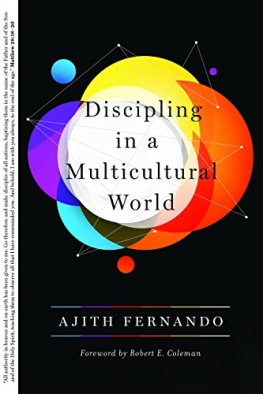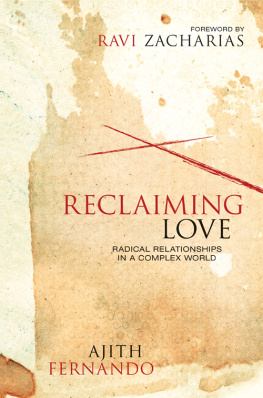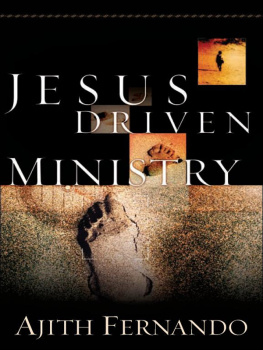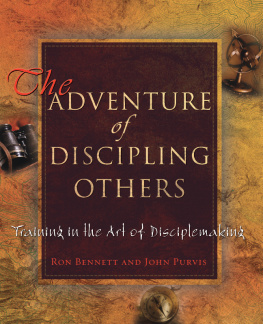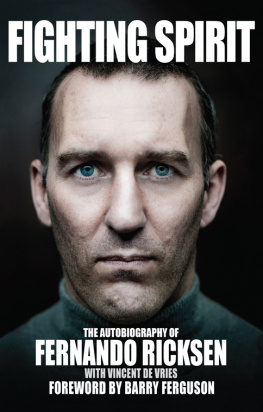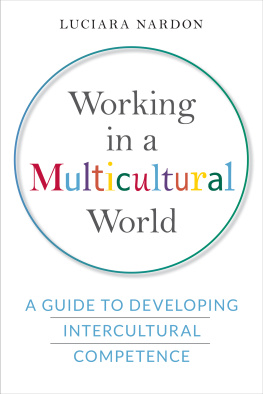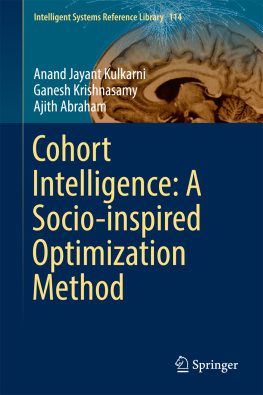Ajith Fernando - Discipling in a Multicultural World
Here you can read online Ajith Fernando - Discipling in a Multicultural World full text of the book (entire story) in english for free. Download pdf and epub, get meaning, cover and reviews about this ebook. year: 0, genre: Religion. Description of the work, (preface) as well as reviews are available. Best literature library LitArk.com created for fans of good reading and offers a wide selection of genres:
Romance novel
Science fiction
Adventure
Detective
Science
History
Home and family
Prose
Art
Politics
Computer
Non-fiction
Religion
Business
Children
Humor
Choose a favorite category and find really read worthwhile books. Enjoy immersion in the world of imagination, feel the emotions of the characters or learn something new for yourself, make an fascinating discovery.
- Book:Discipling in a Multicultural World
- Author:
- Genre:
- Year:0
- Rating:3 / 5
- Favourites:Add to favourites
- Your mark:
- 60
- 1
- 2
- 3
- 4
- 5
Discipling in a Multicultural World: summary, description and annotation
We offer to read an annotation, description, summary or preface (depends on what the author of the book "Discipling in a Multicultural World" wrote himself). If you haven't found the necessary information about the book — write in the comments, we will try to find it.
Discipling in a Multicultural World — read online for free the complete book (whole text) full work
Below is the text of the book, divided by pages. System saving the place of the last page read, allows you to conveniently read the book "Discipling in a Multicultural World" online for free, without having to search again every time where you left off. Put a bookmark, and you can go to the page where you finished reading at any time.
Font size:
Interval:
Bookmark:
Other Crossway Books by Ajith Fernando
The Call to Joy and Pain: Embracing Suffering in Your Ministry
Deuteronomy: Living Obedience to a Loving God
The Family Life of a Christian Leader
Jesus Driven Ministry
And the son said to him, Father, I have sinned against heaven and before you. I am no longer worthy to be called your son. But the father said to his servants, Bring quickly the best robe, and put it on him, and put a ring on his hand, and shoes on his feet. And bring the fattened calf and kill it, and let us eat and celebrate.
Luke 15:2123
Helping Christians face up to their sin, as discussed in the last chapter, has been one of the biggest ministry challenges I have had in the past few decades . Why do Christians deny rather than confess their wrongdoing? Why do Christians lie to get out of an unpleasant situation? Why do Christians find it so difficult not to take revenge when someone has humiliated them? I had heard about the importance of honor and shame in our cultures and in the culture of the Bible and always thought that I must read up a little more about it. The opportunity arose when I was asked in 2007 to write an endorsement for Theology in the Context of World Christianity , by Timothy C. Tennent. This book has an excellent summary of the issue of honor and shame, with biblical reflections on it and hints on how it impacts ministry. That gave fresh impetus to my study of this topic, and to my observation of how it is expressed in ministry and how we should minister in an environment where these are highly valued.
How These Values Operate
In most cultures today, the The minority non -C aucasian and Hispanic populations in North America are also generally honor -a nd -s hame oriented. An action is evaluated more in terms of how it affects the community than in terms of whether it breaks the laws of a supreme God or institution. An action is particularly significant if it brings honor or shame to the community. If confession of wrongdoing brings shame, it is considered wrong.
A teenage girl is sexually abused by her uncle, and she tells her mother about it. The mother rebukes the child, accusing her of bringing shame to her family and even accusing her of triggering the abuse by her loose behavior. A Christian leader is late for a meeting at church because he slept too long. But he lies, saying that he got caught in a traffic jam. Most people in the group know that he is not telling the truth. But because he is their leader, they dont want to shame him. They choose to pretend that they believe him. Accepting that one has done wrong is so shameful that in East Asia (and even in the West) public figures have committed suicide after having to publicly accept their wrongdoing.
This outlook is growing rapidly in the West also. A majority of people in the Western world have abandoned the idea of relating to a supreme God to whom they are accountable and whom they will face at a final judgment. That idea is what helped cultures in the West to frame their understanding of guilt and the need for forgiveness. That also helped the sense of accountability that fueled the trust that characterized Western societies. Today the religion of many is one of self -e ffort . People are asked to have confidence in themselves and achieve their fullest potential through their own initiative. The vague spiritualities popular in the West envision an impersonal life source behind everything, and their understanding of reality is pantheistic (believing that everything is god). In this environment it is not surprising that, even in the West, shame over sin serves as a deterrent to wrongdoing more than guilt over having transgressed Gods law.
When society determines what is right and wrong, shaming (rather than punishment by God) is a key deterrent to wrong. Sex outside marriage, whether heterosexual or homosexual, is not a big deal. Many even believe that giving expression to ones sexual desires (homosexual or heterosexual) is a human right. Yet, society has determined that making sexist statements at work, abusing authority to take sexual advantage of others, and especially sexual abuse of children are shameful and wrong. I certainly agree, but the omission of extramarital sex (which God hates) from the list of wrong deeds is significant.
I believe this trend has continued to intensify in the West since 2000.
In such an environment, people find ways to avoid the shame of admitting wrongdoing. I have already mentioned how people pretend they dont know who is responsible for an action. Everyone may know that an honored member of their group is guiltyones father or mother, or ones pastor, or the director of an organization. But they act as if they do not know. That way they preserve the honor of the group, which is considered the right thing to do.
A friend of mine in Sri Lanka told me how one day his boss severely scolded him for something that had happened in the office for which my friend was not responsible. The boss used brutal and insulting language, and others heard it. Later another employee privately told the boss that someone else was to blame. The next day, the boss began to compliment my friend in front of the rest of the office for the good way in which he did his work. It was his way of avoiding having to say, Im sorry.
Two women in a local church were involved in a bitter conflict. Both were hurt by things the other said and did. A leader in the church, realizing that the hostility between these two members was beginning to hurt the whole church, organized a meeting with the two women to resolve the problem. At the meeting, it emerged that both had contributed to the problem by doing inappropriate things. One woman accepted her wrongdoing and apologized to the other. The other woman did not admit to having done anything wrong. Instead she went up to the first woman and hugged her, saying, Lets forget about this and move forward. She avoided the shame of confession. I must say that in our culture the hugging itself was a brave act and should be acknowledged as such. In honor -a nd -s hame -o riented cultures, where community solidarity is strong, sin is very much of a relational thing. And the problem was tackled relationally. But was it sufficient? We will discuss that later.
Table 1 summarizes how these values operate.
Table 1
Shame-B ased Orientation | Guilt-B ased Orientation |
External sanctions for good behavior | Internal conviction of sin |
Shame and honor | Guilt and forgiveness |
Offense reduces ones standing in the group | Offense transgresses a moral law |
Loss of face | Loss of innocence |
Communal | Individualistic |
Thankfully, the Bible acknowledges the importance of honor and shame. It was written to a culture where honor and shame were very important and due attention was given to these values.
Honor and shame are more effective as motivations for holiness in community -o riented (or collectivist) cultures than in individualistic cultures. Honor and shame are community values. What others think of our life and behavior is important in a biblical community. Therefore, it should be important in Western cultures also because community solidarity is a biblical idea and is not confined to the non -W estern world. Interesting studies have been done on the frequent appearance of the phrase one another in the Bible. There are about fifty places in the Epistles where the Greek word translated one another ( all l n ) refers to relationships between Christians. We saw in chapter 3 that biblical discipling takes place not in an individualistic setting but in a group setting where the community is a major encouragement along the path to godliness.
Font size:
Interval:
Bookmark:
Similar books «Discipling in a Multicultural World»
Look at similar books to Discipling in a Multicultural World. We have selected literature similar in name and meaning in the hope of providing readers with more options to find new, interesting, not yet read works.
Discussion, reviews of the book Discipling in a Multicultural World and just readers' own opinions. Leave your comments, write what you think about the work, its meaning or the main characters. Specify what exactly you liked and what you didn't like, and why you think so.

